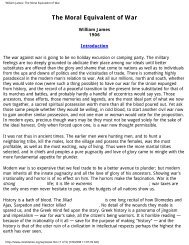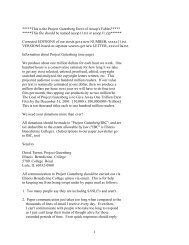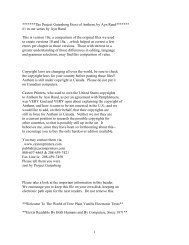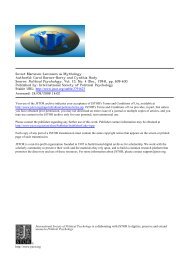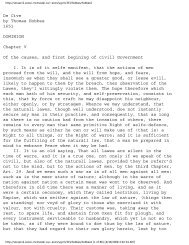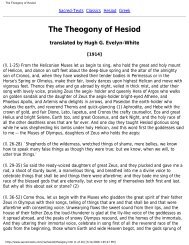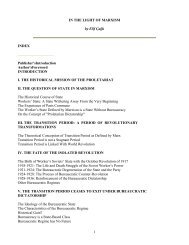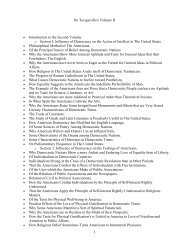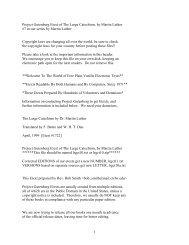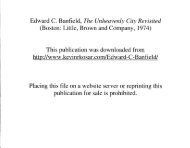Thomas Jefferson: A Manual of Parliamentary Practice
Thomas Jefferson: A Manual of Parliamentary Practice
Thomas Jefferson: A Manual of Parliamentary Practice
Create successful ePaper yourself
Turn your PDF publications into a flip-book with our unique Google optimized e-Paper software.
<strong>Thomas</strong> <strong>Jefferson</strong>: A <strong>Manual</strong> <strong>of</strong> <strong>Parliamentary</strong> <strong>Practice</strong><br />
approbation <strong>of</strong> a majority. These being reported and confirmed by the House, are then<br />
referred to one or more select committees, according as the subject divides itself into one or<br />
more bills. Scob. 36, 44. Propositions for any charge on the people are especially to be first<br />
made in a committee <strong>of</strong> the whole. 3 Hats. 127. The sense <strong>of</strong> the whole is better taken in<br />
committee, because in all committees every one speaks as <strong>of</strong>ten as he pleases. Scob. 49.<br />
They generally acquiesce in the chairman named by the Speaker: but, as well as all other<br />
committees, have a right to elect one, some member, by consent, putting the question. Scob.<br />
36. 3 Grey 301. The form <strong>of</strong> going from the House into committee, is, for the Speaker, on<br />
motion, to put the question that the House do now resolve itself into a committee <strong>of</strong> the<br />
whole, to take under consideration such a matter, naming it. If determined in the affirmative,<br />
he leaves the chair, and takes a seat elsewhere, as any other member; and the person<br />
appointed chairman seats himself at the clerk's table. Scob. 36. Their quorum is the same as<br />
that <strong>of</strong> the House; and if a defect happens, the chairman, on a motion and question, rises, the<br />
Speaker resumes the chair, and the chairman can make no other report than to inform the<br />
House <strong>of</strong> the cause <strong>of</strong> their dissolution. If a message is announced during a committee, the<br />
Speaker takes the chair, and receives it, because the committee cannot. 2 Hats. 125, 126.<br />
In a committee <strong>of</strong> the whole, the tellers on a division, differing as to the numbers, great heats<br />
and confusion arose, and danger <strong>of</strong> a decision by the sword. The Speaker took the chair, the<br />
mace was forcibly laid on the table, whereupon, the members retiring to their places, the<br />
Speaker told the House "he had taken the chair without an order, to bring the House into<br />
order." Some excepted against it; but it was generally approved as the only expedient to<br />
suppress the disorder. And every member was required, standing up in his place, to engage<br />
that he would proceed no further in consequence <strong>of</strong> what had happened in the grand<br />
committee, which was done. 3 Grey 128.<br />
A committee <strong>of</strong> the whole being broken up in disorder, and the chair resumed by the Speaker<br />
without an order, the House was adjourned. The next day the committee was considered as<br />
thereby dissolved, and the subject again before the House; and it was decided in the House,<br />
without returning into committee. 3 Grey 130.<br />
No previous question can be put in a committee; nor can this committee adjourn as others<br />
may; but if their business is unfinished, they rise, on a question, the House is resumed, and<br />
the chairman reports that the committee <strong>of</strong> the whole have, according to order, had under<br />
their consideration such a matter and have made progress therein; but not having had time to<br />
go through the same, have directed him to ask leave to sit again. Whereupon a question is put<br />
on their having leave, and on the time when the House will again resolve itself into a<br />
committee. Scob. 38. But if they have gone through the matter referred to them, a member<br />
moves that the committee may rise, and the chairman report their proceedings to the House;<br />
which being resolved, the chairman rises, the Speaker resumes the chair, the chairman<br />
informs him that the committee have gone through the business referred to them, and that he<br />
is ready to make report when the House shall think proper to receive it. If the House have<br />
time to receive it, there is usually a cry <strong>of</strong> "now, now," whereupon he makes the report; but if<br />
http://www.constitution.org/tj/tj-mpp.htm (16 <strong>of</strong> 70) [4/14/2008 6:37:46 PM]



